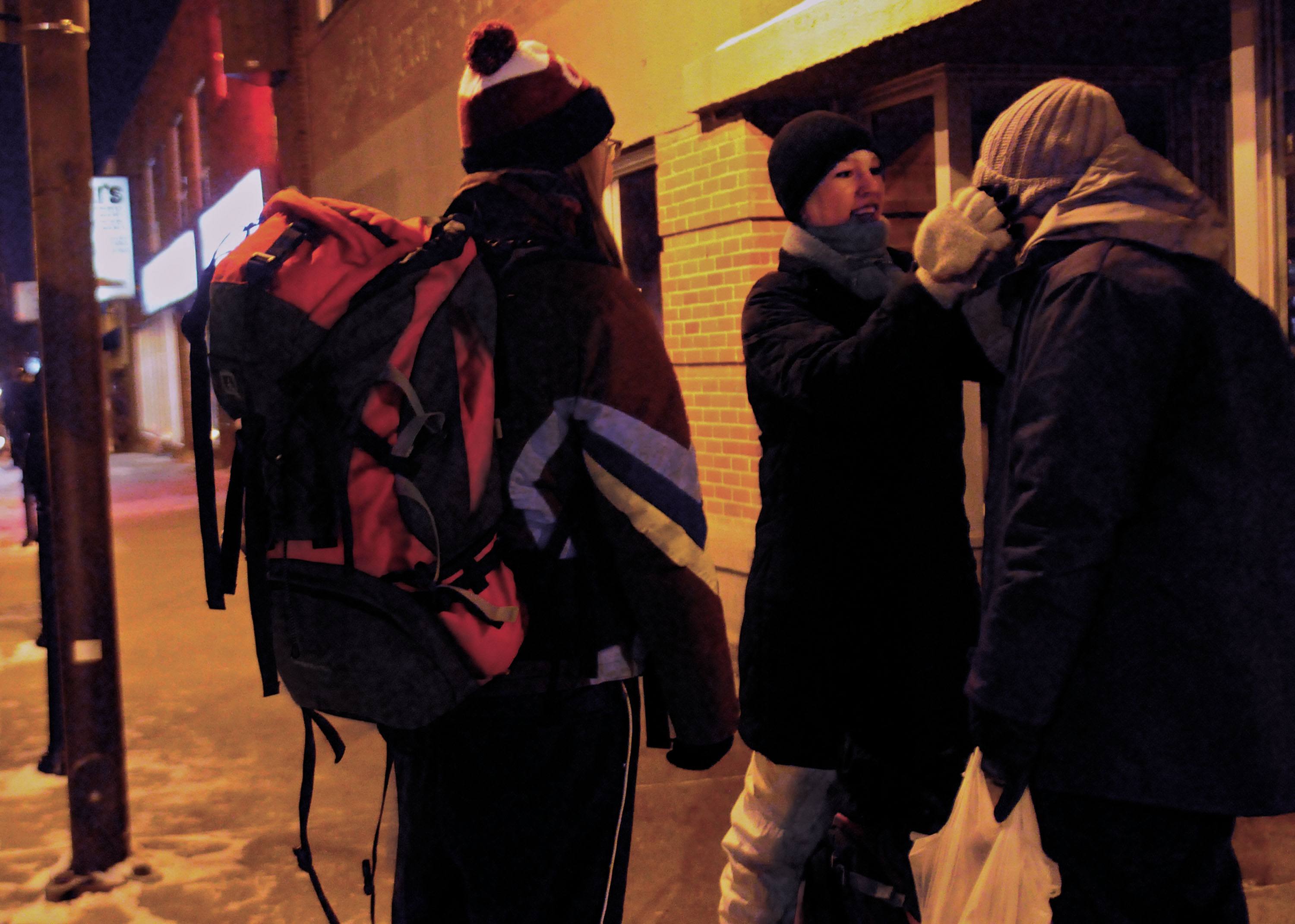Writer Andrew Kooman spent an evening out on the streets of Red Deer recently shadowing workers with the NightReach program. This is part one of a two-part series. Part two will appear in the Dec. 22 edition of the Express.
“NightReach,” Jessica Kvisle says as she shines a lone flashlight and steps under the belly of the bridge. It’s not as cold as it could be. The snow crunches underneath her feet as she looks to see if anyone has made a camp for the night.
“There’s no one there,” she says to her colleague, Ashley Fleming.
A new program run out of the Central Alberta Aids Network Society (CAANS), NightReach has a staff of five workers who hit the streets in pairs every night of the week from 6 to 10:30 p.m. no matter the temperature. “Since the cold spell a few weeks ago we see less people outside,” Fleming says.
Kvisle and Fleming are bundled in layers of long underwear, socks and gloves, snow pants, boots and scarves. With all the winter clothing, the two women are hardly recognizable.
It’s the big red backpacks they carry, filled with harm reduction supplies that make them stand out on the streets of downtown Red Deer and on the trails of packed-down snow that connect the different hubs street-involved people frequent.
In the last few months Kvisle, a nursing student, and Fleming, who studies part time as an international development major, have had their eyes opened to a world many don’t get to see – not because it’s hard to locate or find, but mostly because they refuse to look.
The women start the evening at CAANS where they fill backpacks with supplies: gloves and toques, matches, male and female condoms, inhalation stems, clean syringes in air sealed packages, plastic hosing and mouth pieces for drug users.
CAANS is nestled between Dino’s Pizza and X-Static, an exotic dance club downtown. The office can be a busy hub of activity on any given day.
At the back of building is a storeroom of supplies. Boxes of syringes line shelves. A stash of winter clothing is piled in the corner. “We hand out about 14,000 needles a month,” says Jennifer Vanderschaeghe, executive director of CAANS.
The society also distributes about 400 inhalation stems each month, which Vanderschaeghe explains are “the key piece around preventing Hep C.
Kvisle and Fleming leave the office and walk north toward the downtown going to places most people or agencies cannot or do not go. The primary purpose of NightReach is to reduce harms, among them the spread of HIV and Hepatitis C that substance users face.
The first handout the team gives is a pair of gloves to a woman who recognizes Kvisle from a previous night. She’s with a group of people outside Potter’s Hands. It’s a Tuesday night and they smoke, wait for rides, and talk after the hot meal they’ve just consumed.
“That’s all you got?” she asks, seeing that the gloves are thin, a layer insert meant to fit inside a workman’s glove. It’s all the women have. She takes them thankfully and puts them on.
The women say goodbye and continue walking, crossing Gaetz Ave. to make their way behind the old Alpha factory. Finding a narrow path that carves its way through a treed area they go by foot to the People’s Place in Riverside Meadows.
NightReach staff walk the path every night, hauling their backpacks of supplies so they are more able to connect with street-involved people and those at the various care agencies they visit to help people who fight addiction, live with mental health issues, or have no place to go.
“They’re protective of us,” Fleming says of the people they encounter when asked if she feels safe as they walk late at night into places and through areas any parent worth their mettle would warn young daughters to ever walk alone. Their biggest safety risk? “Traffic,” Fleming says, waiting for a car to pass before she crosses another street.
It’s about 7 p.m. when the two arrive at the People’s Place to see if anyone at the temporary shelter is in need of supplies. They go to the back of the building where a group of five people smoke. Two eat large ice cream cones.
“Do you need anything?” Fleming asks. A woman requests a pair of gloves and some socks as she bemoans the cold. “The doctor wanted to cut off my toes last year when I got frostbite.” She happily kept them, and takes the items Fleming offers.
The whole evening is overshadowed by the death of Jesse Curr earlier in the day. The young man was known by many in the street community and the tragic news haunts the night.
“He was doing so well,” says Halina Jarvis, director of Loaves and Fishes who the women happen to bump into as they leave People’s Place. Jarvis shares her shock at learning of her friend’s death.
“Can I give you a hug?” Kvisle asks shyly. The three women embrace, as tears brim their eyes, a moment that reveals just what’s at stake for the vulnerable communities they serve.
It’s moments like this, Kvisle later explains, human moments that celebrate and recognize the value of a person’s life, that make the gritty work they do worthwhile.



